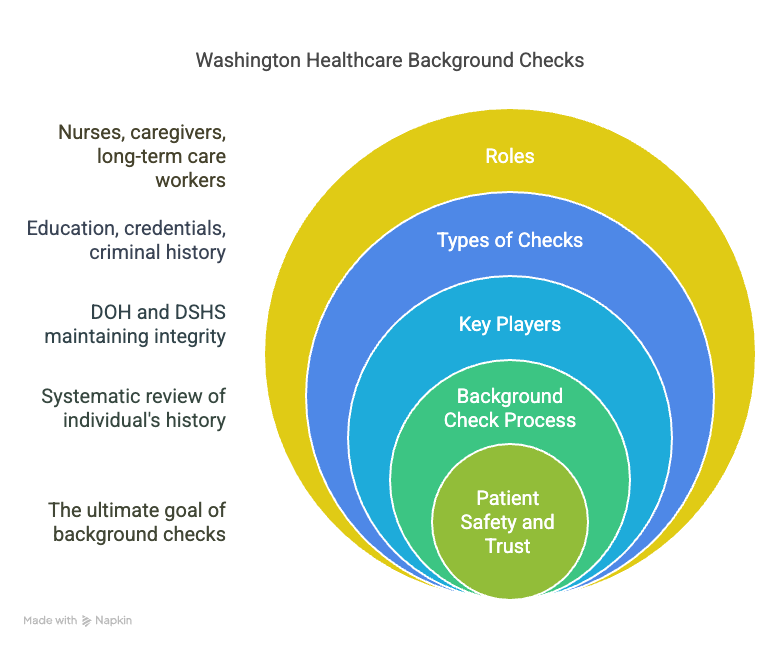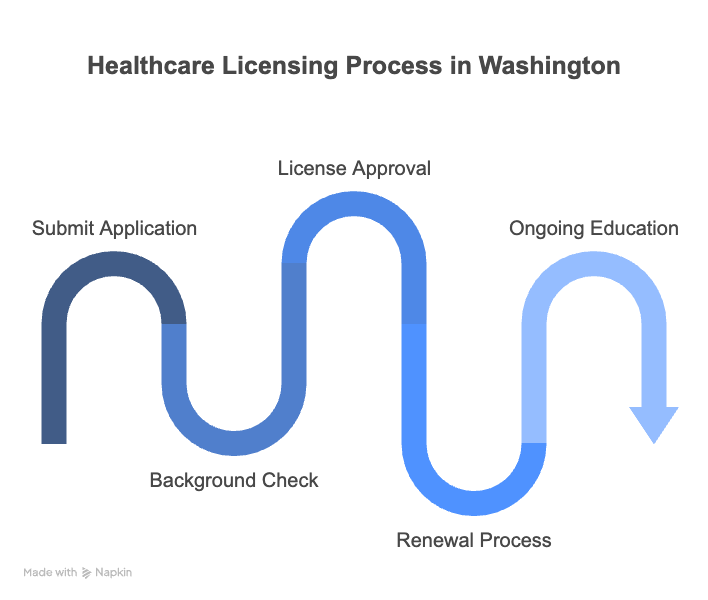Navigating the regulations for healthcare employment in Washington can be tricky. Whether youâre a seasoned healthcare professional or a newcomer looking to join the industry, itâs crucial to understand the requirements around background checks to ensure compliance and maintain ethical standards. In Washington State, healthcare background checks are governed by the Department of Health (DOH) and the Department of Social and Health Services (DSHS). This guide breaks down the essential information you need to know.
Key Takeaways
- Background checks in Washington's healthcare field are vital for ensuring patient safety and maintaining the trustworthiness of caregivers.
- The Department of Health (DOH) regulates licensing through thorough reviews of professional backgrounds and credentials for roles like nurses and pharmacists.
- The Department of Social and Health Services (DSHS) emphasizes stringent background checks with fingerprinting for positions involving direct care for vulnerable populations.
- Applicants must prepare by having accurate personal records and understanding their rights during the background check process to avoid delays or disqualification.
- Staying informed about regulatory changes from DOH and DSHS helps applicants maintain compliance and ensure eligibility in Washington's healthcare industry.
Introduction
In healthcare, patient safety and trust hinge on the integrity of caregivers. Background checks act as a crucial filter, ensuring that only qualified individuals serve in sensitive roles. They are foundational for maintaining safety and professionalism in the field. In Washington State, the Department of Health (DOH) and the Department of Social and Health Services (DSHS) oversee these checks.
The DOH focuses on licensing healthcare professionals, ensuring that individuals meet legal and professional standards before entering the workforce. For nurses, this involves a thorough examination of their professional history and credentials. Other healthcare roles, like pharmacists and mental health counselors, face similar scrutiny to maintain high standards across the board.
DSHS administers checks for roles involving vulnerable populations, such as caregivers for long-term care. Their requirements include fingerprinting and reviewing any criminal history, protecting those who cannot advocate for themselves.
Understanding the nuances of these checks is vital for prospective healthcare workers in Washington. This guide provides clarity on the steps and requirements necessary to navigate this process effectively.
Understanding Washington Healthcare Background Checks
Washington healthcare background checks are a systematic review of an individual's history to ensure they are fit to work in sensitive healthcare settings. The primary goal is to protect patients and maintain trust in the healthcare system. At the heart of these checks are the Department of Health (DOH) and the Department of Social and Health Services (DSHS), two key players in maintaining professional integrity in the healthcare sector.
The DOH focuses on licensing and monitoring various health professionals such as nurses, pharmacists, and mental health counselors. Their checks typically involve verifying education, confirming credentials, and ensuring no disqualifying criminal history exists. For example, a nurse applying for a license in Washington will undergo a background check that includes a review of their criminal record and may include other checks such as verifying past employment.
Meanwhile, the DSHS is concerned with roles like caregivers and long-term care workers. These positions often serve vulnerable populations, which makes comprehensive background checks vital. DSHS background checks often include fingerprinting to ensure precise identification, minimizing the risk of errors in the review process.

Beyond the logistics, the motivation for these checks is clear. They work as a vetting process that aims to eliminate potential risks to patient safety. By checking criminal histories and professional backgrounds, these processes help uphold high standards and protect those who are most vulnerable.
As you navigate these checks, consider the impact of an error-free professional record. Have there been lapses in your past employment that might raise questions? Would choices you made years ago affect your chances today? Understanding these elements can prepare you for the requirements and enhance your career prospects in the healthcare field.
Department of Health (DOH) Requirements
Securing a healthcare position in Washington involves more than just earning a degree and passing exams. The Department of Health (DOH) plays a pivotal role in this process by regulating background checks for various healthcare roles, crucial in maintaining industry standards and public safety.

For nursing professionals, obtaining a WA nursing license means navigating several steps where background checks come into play. First, you must submit an application with the necessary documentation. The DOH requires a thorough background check before granting any nursing license. This includes checking national databases to ensure there are no past disciplinary issues that might affect your ability to practice safely. Any felony convictions or misdemeanors related to healthcare fraud, patient abuse, or drug-related offenses can slow down the licensing process or lead to denial.
The DOH doesn't stop at nurses. Other healthcare roles, like pharmacists, mental health counselors, and physicians, also face stringent background checks. Each profession has unique requirements. For instance, mental health counselors may need checks tied to any previous practice states, while pharmacists might need additional scrutiny if theyâve worked in controlled substance-related roles.
License renewal and ongoing education also involve compliance with DOH checks. Renewal often requires affirmation that no new offenses have occurred since the last licensing period. Some professions might also need a fresh criminal background check to ensure ongoing eligibility.
These regulations may seem demanding, but they serve a critical purpose. They protect patients and maintain the integrity of the healthcare system. By understanding these requirements and preparing adequately, you streamline your process for entering the field and contribute to a trusted environment for patient care. How ready are you to meet these standards and uphold the trust placed in healthcare professionals?
Department of Social and Health Services (DSHS) Requirements
Navigating DSHS background checks involves understanding specific roles and requirements. DSHS primarily focuses on positions related to direct care and custodial roles, such as caregivers and long-term care workers. These roles demand stringent checks due to their direct impact on vulnerable populations.
Roles Covered
If you're applying for a caregiver position or a similar role, expect DSHS to conduct a thorough background check. The focus is on ensuring individuals in charge of others' well-being have no history of behavior that could pose risks. This process includes verifying past employment and checking for disqualifying criminal records.
Caregiver Disqualifications
Several factors can lead to disqualification. Felony convictions, especially those related to violence, theft, or drug offenses, often result in ineligibility. Even certain misdemeanors can raise concerns, particularly if they suggest a history of untrustworthiness or abuse. It's essential to understand that this process prioritizes safety and trust.
DSHS Fingerprinting
Fingerprinting is a critical step in the DSHS background check process. It's used to verify identity and check for criminal history. The fingerprinting process is straightforward but vital, as it links your fingerprints to national databases, ensuring any criminal background is revealed and evaluated. This step might feel invasive, but it is crucial for the integrity and safety of the services provided.
Understanding and preparing for these requirements can help streamline your application process. Make sure you know what is expected, so you can avoid unnecessary delays or disqualification risks.
The Application Process
You need a clear roadmap to navigate the background check process in Washington's healthcare sector. Here's a straightforward guide to help you through it.
Step 1: Preparing Your Application
Start by gathering all the required information about your education, employment history, and any professional licenses you hold. Double-check that your personal information is accurate and up-to-date.
Step 2: Collecting Necessary Documents
Scan or photocopy documents like your driver's license, proof of residence, and any certifications relevant to your healthcare role. Some positions may require additional documentation, like transcripts or certification verification.
Step 3: Completing Fingerprinting
Schedule an appointment for fingerprinting. This is mandatory for certain roles, especially those involving direct patient care. The DSHS uses fingerprinting to conduct thorough national background checks.
Step 4: Submission Procedures
Once your application and documents are ready, submit them to the appropriate agency, whether it's the DOH or DSHS. Be sure to follow any instructions on the application portal to avoid delays.
Move through each step diligently to confirm your compliance with state regulations. What would be challenging without preparation becomes manageable when you know the next step. How confident are you in your preparations?
Rights and Responsibilities
Applicant Rights
When you apply for a position requiring a background check, you have specific rights. First, you must consent before an employer can run a background check. No sneaky business is allowed. If anything negative shows up, you have the right to know about it. Under the Fair Credit Reporting Act (FCRA), you must receive a copy of the report and âA Summary of Your Rights Under the FCRA.â If thereâs an error in your report, you're entitled to dispute it. Information isnât always accurate, and you shouldnât be penalized for mistakes. You have the right to clarify or correct any inaccuracies.
Employer Responsibilities
Employers in Washington have rules to follow. They need to inform you that a background check will be conducted and get your written permission. Employers cannot just âwing itâ and skip steps. They have to comply with FCRA and state-specific guidelines. If they decide not to hire or promote you based on the background check, they must provide you with a pre-adverse action notification. This gives you a chance to view the report and challenge any errors. Employers must also stay current with state laws, ensuring their processes align with any new regulations. Ignorance won't excuse them. By ensuring compliance, both applicants' rights and vulnerable populations' protection are prioritized, creating a safe and fair hiring practice.
Keeping Up with Regulatory Changes
Staying informed about regulatory changes is essential for maintaining compliance. Laws governing healthcare background checks can shift, affecting both your practices and the expectations of state authorities. To stay ahead, regularly review updates from official sources like the Washington State Department of Health (DOH) and the Department of Social and Health Services (DSHS).
Additionally, sign up for newsletters or alerts from these agencies. These updates can provide you with timely information about any modifications to the requirements or processes. Engaging in industry forums or groups can also provide insights from peers who may have firsthand experience with navigating changes.
Accessing reliable resources is crucial. Start with the DOH and DSHS websites for official guidance. The Federal Trade Commission (FTC) also offers useful information on background checks. Bookmark these sites and check them periodically.
Finally, consider any implications these changes may have on your current procedures. Adjust your processes promptly to reflect new guidelines and ensure your compliance strategy is future-proof.
Conclusion
Washington healthcare background checks are a cornerstone of maintaining safety and trust in the industry. Understanding DOH and DSHS requirements helps you navigate the licensing and employment landscape effectively. Remember, these checks are in place not just as regulatory hurdles but to shield vulnerable populations and uphold professional integrity.
To keep your professional record spotless, always be proactive. Conduct regular self-checks on your records and stay updated with changes in healthcare regulations. Continuous education not only helps you grow professionally but also keeps you aligned with evolving standards.
These background checks are vital in building a reliable and ethically sound healthcare system in Washington. By adhering to these requirements, you contribute to a culture of trust and safety, ensuring that patients receive the best possible care.
Frequently Asked Questions (FAQs)
What crimes disqualify healthcare workers in WA?
Violent crimes, sexual offenses, identity theft, and certain drug offenses can disqualify you from working in healthcare in Washington.
How long do WA nursing background checks take?
Background checks for nursing in Washington typically take between 2 to 4 weeks. However, this can vary based on the specifics of your history.
Can a DUI affect a nursing license in WA?
Yes, a DUI can impact your nursing license. The Washington Nursing Care Quality Assurance Commission reviews such cases. Your license could be placed on probation, suspended, or revoked depending on the severity.
Does Washington accept out-of-state healthcare checks?
Washington does not accept out-of-state background checks. All healthcare workers must undergo a state-level background check.
How to appeal a denied healthcare license in WA?
If your healthcare license application is denied, you can appeal by requesting a hearing with the Washington State Department of Health. This request must be made within 28 days of the denial.
Are expunged records visible to WA medical boards?
Expunged records typically aren't visible to the boards. However, it's best to confirm your specific case with a legal expert.
Do WA hospitals require FBI checks?
Yes, many hospitals in Washington require FBI background checks for new hires to ensure a comprehensive review of your history.
Whatâs the cost of healthcare checks in Washington?
The cost varies, but you can expect to pay between $50 and $100 for a full background check, depending on the services requested.
Can you work in healthcare with a misdemeanor in WA?
Some misdemeanors might not disqualify you. Each case is reviewed individually, focusing on the type and recency of the offense.
Does WA check the National Sex Offender Registry?
Yes, checks for healthcare positions in Washington include the National Sex Offender Registry to ensure patient safety.
Are drug tests part of the background check process?
Drug tests are not typically part of the background check but may be required by employers before hiring.
What can delay the background check process?
Incomplete applications or additional information requests can delay the process. Always provide complete and accurate details.
Is fingerprinting required for healthcare checks in WA?
Yes, fingerprinting is often needed to ensure complete background checks. This helps verify identity and check criminal records accurately.
How do disciplinary records affect licensing in WA?
Previous disciplinary actions can impact the licensing process. They are examined to determine if they affect your ability to practice safely.
Definitions
Background Check
A background check is a review of your personal and professional history to assess your eligibility for a job. In healthcare, this includes looking into your criminal record, verifying credentials, confirming past employment, and checking national databases. Employers use this data to protect patients and ensure you're qualified for the role.
Licensing
Licensing is the official approval granted by a government agency, like the Department of Health (DOH), that allows you to legally work in a healthcare profession. It requires proof of education, passing exams, and completing a background check. For example, nurses and pharmacists must hold valid licenses to practice in Washington State.
Fingerprinting
Fingerprinting links your identity to national criminal databases using your unique biometric data. Itâs required for some healthcare roles, especially those involving one-on-one care with vulnerable populations. The Department of Social and Health Services (DSHS) uses it to ensure accurate background check results.
Disqualification
Disqualification means being deemed ineligible for a position due to certain findings in your background check. Examples include convictions for abuse, theft, or drug-related offenses. Even some misdemeanors can disqualify you, depending on the role and severity. Understanding what leads to disqualification can help you prepare better.
Employment History
Employment history is a record of where youâve worked, when, and in what roles. Employers and licensing bodies check this to confirm your experience and verify that your background aligns with what youâve claimed. Make sure dates, titles, and job duties are accurateâdiscrepancies can delay or block your application.
References
- Washington DSHS Background Check Central Unit: https://www.dshs.wa.gov/ffa/background-check-central-unit/turnaround-times
- Washington Rule Clarification for Long-Term Care Workers (2024): https://www.certiphi.com/blogs/industry-news/2024/9/washington-rule-clarifies-background-check-requirements-for-long-term-care-workers/
- House Bill 1385 Article (2025): https://seattlemedium.com/washington-state-house-passes-bill/

GCheck Editorial Team
Meet the GCheck Editorial Team, your trusted source for insightful and up-to-date information in the world of employment background checks. Committed to delivering the latest trends, best practices, and industry insights, our team is dedicated to keeping you informed.
With a passion for ensuring accuracy, compliance, and efficiency in background screening, we are your go-to experts in the field. Stay tuned for our comprehensive articles, guides, and analysis, designed to empower businesses and individuals with the knowledge they need to make informed decisions.
At GCheck, we're here to guide you through the complexities of background checks, every step of the way.





